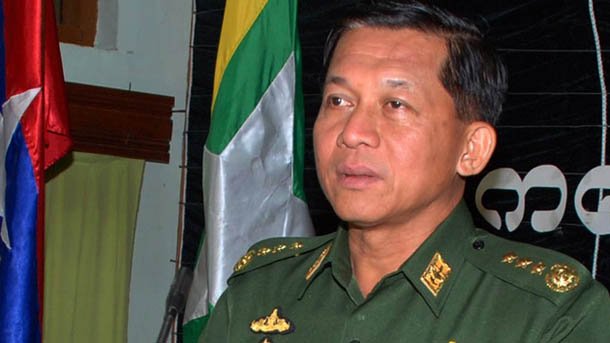RANGOON — Burma Army Commander-in-Chief Min Aung Hlaing has said it is “difficult” for him to meet with opposition leader Aung San Suu Kyi and he defended the Constitution, which includes controversial clauses that block Suu Kyi from the presidency and grant the military political powers.
In an interview with Voice of America on Saturday, Snr-Gen. Min Aung Hlaing said he was reluctant have a one-on-one meeting with the hugely popular opposition leader because they might have differing political objectives.
“We have been engaged in national politics, and our intentions may be different. If that case, it will be difficult for us to hold a bilateral discussion. Yes, it is difficult,” he said, adding that he did not rule out a meeting.
Suu Kyi has long asked for a meeting with President Thein Sein, Min Aung Hlaing and Union Parliament Speaker and ruling party chairman Shwe Mann, in order to address the reforming the charter, which is seen as undemocratic.
Thein Sein told VoA in an interview last week that such a meeting would not take place, adding that he wanted to have a meeting that also includes a number of ethnic party leaders, vice-presidents and other ruling party officials. A view that was echoed by Min Aung Hlaing.
Such a meeting was called on Oct. 31 shortly before US President Obama’s visit, but Suu Kyi later said it had been a purely symbolic gathering without concrete discussions.
The commander of the army, which enjoys significant political powers under the 2008 charter drafted by the then-military regime, denied that Article 59(f), which bans anyone with a foreign spouse or children from the presidency, was aimed at Suu Kyi. She has two sons who are British nationals.
Min Aung Hlaing claimed the article was necessary for historical and geographical reasons.
“This limitation does not aim at one particular individual or one group or one ethnic group, but covers the whole nation. Another problem is [that] we have to consider the situations that existed since the pre-independence period, and we have lots of immigration problems as we are a country between extremely populated countries,” he was quoted as saying.
The army chief then went on to state that the military would defend the Constitution, adding that it had public support because it was ratified after a 2008 referendum—a vote that is widely viewed as having been rigged by the then-junta.
“It is a law written systematically and in order. Therefore, it is a very important law for us. When it was ratified through a referendum in 2008 more than 26 million of over 27 million eligible voters voted in favor. It was a law supported and ratified by the overwhelming majority, 92.48 percent voted yes. At that time, it was very much welcomed by the people, this was undeniable,” Min Aung Hlaing claimed.
“As it [the Constitution] is the foundation of the country, we accept that Tatmadaw is responsible to safeguard it,” he said.
Since January, Suu Kyi’s National League for Democracy has worked with the popular 88 Students Peace and Open Society leaders to launch a people’s movement that calls for significant constitutional reforms. It collected five million signatures in support of the demands, but the ruling party, government and army have dragged their feet on discussing such changes.
Shwe Mann said last week that charter reforms were unlikely before the 2015 election.
Min Aung Hlaing raised questions over the NLD’s petition methods and played down the significance of the campaign, saying this amount of public support need only be considered if expressed in a referendum.
“We don’t know how those five million signatures were gathered. There may be various ways of garnering them. I don’t also know how valid they are,” he was quoted as saying. “If steps are taken according to procedures, and those five million take part in the national referendum, then their wishes will be taken into consideration.”
Suu Kyi told VoA in an interview this weekend that she would keep pushing for charter reform despite the lack of cooperation from the government, army and ruling Union Solidarity and Development Party, which comprises members of the former junta.
“We never expected it to be easy but believed it to be possible. The question is when. If we can change the Constitution earlier, it is better for the country. We need the courage and ability to change whatever needs to be changed for the betterment of the country,” the NLD leader said.

















